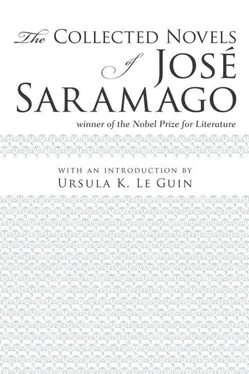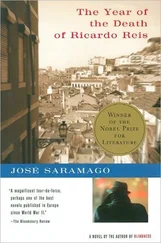They enter by the Wooden Gate, one of thirteen entrances to the Temple. It has an inscription in Greek and Latin carved into the stonework, which reads as follows, It is forbidden for any Gentile to cross this threshold and the balustrade surrounding the Temple, trespassers will be put to death. Joseph and Mary enter, carrying Jesus between them, and in due course will make a safe exit, but the doves, as we know, must be killed according to the law before Mary’s purification can be acknowledged and ratified. Any ironic or irreverent disciple of Voltaire will find it difficult to resist making the obvious remark that, things being what they are, purity can be maintained only so long as there are innocent creatures to sacrifice in this world, whether turtledoves, lambs, or others. Joseph and Mary climb the fourteen steps to the platform of the Temple. Here is the Court of the Women, on the left the storehouse for the oil and wine used in the liturgy, on the right the Chamber of the Nazirites, priests who do not belong to the tribe of Levi and who are forbidden to cut their hair, drink wine, or go near a corpse. On the opposite side, to the left and right, respectively, of the door facing this one, are the chamber where the lepers who believe themselves cured wait for the priests to come and examine them, and the storehouse where the wood is kept and inspected daily, because rotten and worm-eaten wood must not be thrown on the altar fire. Mary has not much farther to go, she still has to climb the fifteen semicircular steps leading to the Nicanor Gate, also known as the Gate Beautiful, but there she will stop, because women are not permitted to enter the Court of the Israelites, which lies beyond this gate. At the entrance, the Levites receive those who have come to offer sacrifice, but the atmosphere is less pious, unless piety at that time had another meaning. It is not just the smoke rising from the burning fat or the smell of fresh blood and incense but also the shouting of the men, the howling, bleating, and lowing of the animals waiting to be slaughtered, and the last raucous squawk of a bird once able to sing. Mary tells the Levite in attendance that she has come for purification, and Joseph hands over the doves. For one brief moment Mary places her hands over the birds, her only gesture before the Levite and her husband turn away and disappear through the gate. She will not stir until Joseph returns, she simply steps aside so as not to obstruct the passage, and waits, holding her son in her arms.
Within the Court of the Israelites there is a furnace and a slaughterhouse. On two sizable stone slabs, larger animals such as oxen and calves are killed, also sheep, ewes, and male and female goats. There are tall pillars alongside the tables, where the carcasses are suspended from hooks set into the stonework, and here one can watch the frenzied activity as the butchers wield their knives, cleavers, axes, and handsaws, the air filled with fumes rising from the wood and the singed hides, and with the smell of blood and sweat. Anyone witnessing this scene would have to be a saint to understand how God can approve of such appalling carnage if He is, as He claims, the father of all men and beasts. Joseph has to wait outside the balustrade that separates the Court of the Israelites from that of the priests, but from where he stands he has a good view of the high altar, four times higher than the tallest man, and of the Temple proper beyond, for the arrangement is like one of those Chinese boxes with each chamber leading into another. We see the building from afar and think to ourselves, Ah, the Temple, then we enter the Court of the Gentiles and once more think, Ah, the Temple, and now the carpenter Joseph, leaning on the balustrade, looks up and says, Ah, the Temple, and he is right, there is the wide front, with its four columns set into the wall, the capitals festooned with laurel leaves in the Greek style, and the great gaping entrance, which has no door, but to enter that Temple of Temples inhabited by God would be to defy all prohibitions, to pass through the holy place called Hereal, and finally come into Debir, which is the last chamber of all, the Holy of Holies, an awesome stone chamber as empty as the universe, windowless and dark as the tomb, where the light of day has never and will never penetrate, until the hour of its destruction, when all the stones are reduced to rubble. The more remote He is, the more holy he becomes, while Joseph is merely the father of a Jewish child among many. He is about to witness the sacrifice of two innocent doves, that is, the father not the son, for the son, who is just as innocent, is in his mother’s arms, perhaps thinking, if such a thing is possible at his age, that this is how the world must always be.
By the altar, which is made of massive slabs of stone untouched by tools since hewn from the quarry and set up in this vast edifice, a barefooted priest wearing a linen tunic waits for the Levite to hand over the turtledoves. He takes the first one, carries it to a corner of the altar, and with a single blow knocks the head from its body. The blood spurts everywhere. The priest sprinkles blood over the lower part of the altar and then places the decapitated bird on a dish to drain the rest of the blood. At the end of the day he will retrieve the dead bird, for it now belongs to him. The other turtledove has the honor of being wholly sacrificed, which means it will be incinerated. The priest ascends the ramp leading to the top of the altar, where the sacred fire burns. On the righthand edge of the altar he beheads the bird, sprinkles its blood over the plinth adorned on each corner with sheeps’ horns, then plucks out the entrails. No one pays any attention to what is happening, for this is a death of no consequence. Craning his neck, Joseph tries to identify, amid all the smoke and smells, the smoke and smell of his own sacrifice, when the priest, having poured salt over the bird’s head and carcass, tosses the pieces into the fire. Joseph cannot be sure. Crackling in the billowing flames fueled by fat, the limp, disemboweled carcass of the little dove would not even fill a cavity of one of God’s teeth. At the foot of the ramp three priests are waiting. A calf topples to the ground, felled by a cleaver, my God, my God, how fragile You have made us and how vulnerable to death. Joseph has nothing more to accomplish here, he must withdraw, collect his wife and child, and return home. Mary is pure once more, not in the strict sense of the word, because purity is something to which most human beings, and above all women, can scarcely hope to aspire. With time and a period of seclusion, her fluxes and humors have settled down, everything has returned to normal, the only difference being that there are now two doves fewer in the world and one more child, who caused their death. The family leaves the Temple by the same gate they entered, Joseph goes to fetch the donkey, and Mary, stepping on a large stone, climbs onto the animal’s back while Joseph holds the child. This is not the first time, but perhaps the memory of that turtledove having its entrails plucked out causes him now to linger before handing Jesus back to his mother, as if convinced that no arms can protect his son better than his own. He accompanies his wife and child to the city gate before returning to the Temple site. He will also be here tomorrow to finish his week’s work, and then, God willing, they’ll be off to Nazareth with all haste.
That same night, the prophet Micah revealed what he had hitherto withheld. As King Herod, by now resigned to his tortured dreams, waited for the apparition to disappear after the usual ranting and raving, which no longer had much effect, the prophet’s formidable shape suddenly grew bigger, and he uttered words he had never spoken before, It is from you, Bethlehem, so insignificant among the families of Judah, that the future ruler of Israel has come. And at that moment the king awoke. Like the deepest chord of a harp, the prophet’s words continued to resound through the room. Herod lay with his eyes open, trying to fathom the meaning of this revelation, if there was indeed any meaning, and was so absorbed that he scarcely felt the ants gnawing under his skin or the worms tunneling in his entrails. The prophecy was familiar to every Jew and revealed nothing Herod did not already know. Besides, he was never one to waste his time worrying about the sayings of the prophets. What bothered him was a vague disquiet, a sense of agonizing strangeness, as if the prophet’s utterance had another meaning and that somewhere in those syllables and sounds lay an imminent and fearsome threat. He tried to rid himself of this obsession and go back to sleep, but his body resisted, aching to the marrow. Thinking offered some measure of relief. Staring up at the beams on the ceiling, where the decoration appeared to vibrate in the light of aromatic torches shielded by fire screens, King Herod searched for an answer but could find none. He then summoned the chief eunuch from among those guarding his bedside and ordered him to fetch at once from the Temple a priest bearing the Book of Micah.
Читать дальше












